Last week, the Department of Justice announced it had reached a plea deal with the founder of WikiLeaks, Julian Assange. The deal immediately reignited the debate over Assange’s legacy. Much of the discussion has focused on WikiLeaks’ release of hundreds of thousands of national security documents in 2010 and 2011. Indeed, the case against Assange was strictly limited to his role in soliciting the leak of those files and then posting them online. That massive leak, one of the biggest in U.S. history, catapulted Assange to worldwide fame—and infamy. But there is another aspect of Assange’s career that is arguably even more consequential: WikiLeaks’ collusion with Russian government hackers during the 2016 presidential campaign.
Assange founded in WikiLeaks in 1999, but he did not begin actively marketing it as a hub for whistleblowers until 2006. At first, Assange described his project as a “an uncensorable system for untraceable mass document leaking and public analysis.” The site’s first leak, dealing with the brewing conflict between rebels and the government in Somalia, was less than sensational. Over time, however, Assange made it clear that his main target was the U.S. government. WikiLeaks built a network of media allies in the early 2010s by feeding journalists a steady diet of U.S. military, State Department, and National Security Agency (NSA) secrets. In 2016, Assange repurposed his network to go after a new foe: Hillary Clinton.
Assange’s hatred of Clinton, whom he described as a “demon,” is well-attested. In November 2015, Assange wrote to others that “it would be much better for GOP to win” because Clinton was a “sadistic sociopath.” Assange made it his goal in 2016 to counter the “American liberal press,” which he accused of supporting Clinton. He aimed to turn that same press against her. Ultimately, with Russia’s help, Assange succeeded.
In March 2016, WikiLeaks produced a searchable archive of Clinton’s emails. The archive was mainly a nothingburger because the emails had already been made public via Freedom of Information Act (FOIA) requests. But the archive served another purpose. Private WikiLeaks messages uncovered by federal investigators revealed that the intent behind the archive was to encourage “people to send us even more leaks.”
That same month, Russia’s GRU (the Main Intelligence Directorate) launched a spearphishing campaign aimed at top Democrats, including Clinton campaign manager John Podesta. The following month (April 2016), the GRU’s men used the login credentials it tricked Democrats into giving them to access thousands of emails on networks maintained by the Democratic National Committee (DNC) and the Democratic Congressional Campaign Committee (DCCC).
The GRU posted some of these hacked emails online through its own fictitious personas: “Guccifer 2.0” and “DCLeaks.” But the pseudonymous personalities lacked the distribution capabilities of a much more established player in the digital world’s hack-and-release game: WikiLeaks.
July 2016: ‘Conflict Between Bernie and Hillary Is Interesting’
On June 16, 2016, GRU officers using the pseudonym “DCLeaks” sent a direct message to WikiLeaks via Twitter. According to special counsel Robert Mueller’s Report on the Investigation Into Russian Interference in the 2016 Presidential Election, the GRU’s men wrote:
You announced your organization was preparing to publish more Hillary’s emails. We are ready to support you. We have some sensitive information too, in particular, her financial documents. Let’s do it together. What do you think about publishing our info at the same moment? Thank you.
We do not know if or how WikiLeaks responded to this message. The next line in the Mueller report is redacted to hide an “investigative technique” that may have uncovered WikiLeaks’ reply.
We do know that the person running the WikiLeaks Twitter account (presumably Assange or one of his associates) separately reached out to another GRU persona, the hacker known as “Guccifer 2.0.” Via direct message, on June 22, WikiLeaks asked Guccifer 2.0 to “[s]end any new material [stolen from the DNC] here for us to review and it will have a much higher impact than what you are doing.”
Then, on July 6, Wikileaks messaged Guccifer 2.0 once again: “if you have anything hillary related we want it in the next tweo [sic] days prefable [sic] because the DNC is approaching and she will solidify bernie supporters behind her after.” The GRU’s men responded through their Guccifer 2.0 persona: “ok … i see.” WikiLeaks made its intent crystal clear in a follow-up message: “we think trump has only a 25% chance of winning against hillary … so conflict between bernie and hillary is interesting.” WikiLeaks also wrote to Guccifer 2.0: “we think the public interest is greatest now and in early october.”
WikiLeaks wanted to release Hillary Clinton’s emails and other documents to fuel a “conflict” between Clinton and Sanders supporters.
On July 14, according to the Mueller report, the GRU’s officers (again using their Guccifer 2.0 alias) provided WikiLeaks with access to the “archive of DNC files.”
On July 22, 2016—just three days before the Democratic National Convention—WikiLeaks released more than 19,000 emails and 8,000 attachments. The material had been stolen from “seven key figures in the DNC” and was marketed as “part one” of WikiLeaks’ “new Hillary Leaks series.” Just as WikiLeaks had hoped, the press highlighted DNC emails showing tensions with the Sanders campaign.
- A New York Times (July 22) headline read: “Released Emails Suggest the D.N.C. Derided the Sanders Campaign.”
- NPR (July 23) reported: “Leaked Democratic Party Emails Show Members Tried To Undercut Sanders.”
- The Guardian (July 23) followed suit: “Leaked DNC emails reveal details of anti-Sanders sentiment.”
- ABC News (July 25) summarized the Sanders-related emails in a piece titled: “The 4 Most Damaging Emails From the DNC WikiLeaks Dump.”
- The Washington Post (July 25) reported that the “most damaging emails suggest the committee [DNC] was actively trying to undermine Bernie Sanders’s presidential campaign.”
WikiLeaks was onto something. It was widely known at the time that Sanders’ voters were dissatisfied with the prospect of Hillary Clinton’s nomination. And the DNC clearly preferred Clinton. Polling from earlier in the year revealed that some Sanders voters were even willing to vote for Trump. Seizing on this opportunity, the Trump campaign reached across party lines to woo Sanders’ voters, appealing to their anti-establishment, populist sentiment.
In the end, some Sanders voters—perhaps a significant number of them—did vote for Trump. Post-election surveys showed that as many as 6 to 12 percent of Sanders voters cast their ballot for Trump. We cannot know how many of these Democratic primary voters decided to back the Republican candidate because of WikiLeaks’ information operation. Some Sanders’ voters would have opposed her regardless. But the GRU’s hack and WikiLeaks’ release of the DNC’s internal communications was clearly aimed at one of Clinton’s weaknesses. Assange himself explained to the press that the release of the hacked DNC emails was timed for “when we knew there would be maximum interest by readers.”
The Podesta Emails
WikiLeaks was not finished releasing hacked emails. On October 7, 2016, Assange’s organization posted a tranche of emails from Podesta’s account. Although the GRU’s spooks got access to the emails in March 2016, the Russians and WikiLeaks sat on them until the height of the campaign.
WikiLeaks’ release of the stolen emails was especially well-timed to assist the Trump campaign. Just one hour (or less) prior to WikiLeaks’ release, according to the Mueller report, news first broke of the infamous Access Hollywood tape. The recording captured Trump claiming that women let you “do anything” if you are a “star,” including: “Grab them by the p—y.”
WikiLeaks made sure that the Access Hollywood tape did not dominate headlines for long. According to the Mueller report, Assange’s organization “released 33 tranches of stolen emails between” October 7 and the day before the election, November 7. In sum, WikiLeaks released more than “50,000 documents stolen from Podesta’s personal email account” including private speeches given by Clinton and internal communications between Podesta and other Clinton campaign staffers. Republican National Committee Chairman Reince Priebus seized on Clinton’s highly paid Wall Street speeches to argue that Sanders’ supporters, many of whom are ardently opposed to big business, should not support her.
In the aftermath of Trump’s surprising victory in 2016, there was a lot of attention paid to fake news, disinformation, and Russian efforts to place divisive ads on social media. But the tsunami of coverage surrounding Clinton’s and the Democrats’ emails likely had much more of an effect on Americans’ perceptions—and votes—than any social media ads.
In late 2017, for instance, the Columbia Journalism Review published a study by researchers who looked at the media’s coverage of the 2016 campaign. The researchers counted more than 100,000 sentences published in mainstream media outlets such as the New York Times, the Washington Post, and the Wall Street Journal. They found that “the various Clinton-related email scandals … accounted for more sentences than all of Trump’s scandals combined (65,000 vs. 40,000) and more than twice as many as were devoted to all of her policy positions.” Trump had many scandals of his own, the authors reminded readers, but none of them received nearly as much coverage as Clinton’s and the Democrats’ emails. “In just six days,” the researchers found, “The New York Times ran as many cover stories about Hillary Clinton’s emails as they did about all policy issues combined in the 69 days leading up to the election.”
Trump successfully turned Clinton’s use of a private email server as secretary of state (a real scandal) into a major political issue in 2016, with his supporters chanting “lock her up” at rallies. But WikiLeaks kept adding fuel to Clinton’s email fire. WikiLeaks release of Podesta’s emails also led to new right-wing conspiracy theories that took political hatred to new levels— namely, PizzaGate, the bizarre belief that Podesta, Clinton, and other elite Democrats were running a satanic pedophile ring. PizzaGate is the precursor to QAnon, another conspiracy theory that has swept across the MAGA right.
Republican Intel Leaders: WikiLeaks Colluded With Russia
During the 2016 presidential campaign, Mike Pompeo, then a Republican congressman from Kansas, tweeted a link to a blog post highlighting emails showing that the DNC favored Clinton over Sanders.
Less than a year later, during his first speech as President Donald Trump’s CIA director, Pompeo blasted WikiLeaks, specifically pointing to its role in releasing the DNC emails hacked by the GRU (emphasis added):
It is time to call out WikiLeaks for what it really is – a non-state hostile intelligence service often abetted by state actors like Russia. In January of this year, our Intelligence Community determined that Russian military intelligence—the GRU—had used WikiLeaks to release data of US victims that the GRU had obtained through cyber operations against the Democratic National Committee. And the report also found that Russia’s primary propaganda outlet, RT, has actively collaborated with WikiLeaks.
In March 2018, the House Permanent Select Committee on Intelligence (HPSCI) published its “Report on Russian Active Measures.” At the time, HPSCI was chaired by California Rep. Devin Nunes, a Trump loyalist who has since retired from the House. Nunes is currently the CEO of the parent company for the unironically named Truth Social.
Under Nunes’ leadership, HPSCI concluded that WikiLeaks “played a key role in Russia’s malign influence campaign and served as a third-party intermediary for Russian intelligence during the period leading up to the 2016 U.S. presidential election.” The Republican-led HPSCI found that WikiLeaks was “an ideal intermediary for Russian intelligence” because its “historic actions” have “undermined U.S. interests and been beneficial to Russia.” In addition, WikiLeaks’ was “an attractive outlet for the dissemination of stolen documents intended to undermine the United States and its electoral process.”
In August 2020, the U.S. Senate Select Committee on Intelligence released the fifth and final volume of its report on “Russian Active Measures Campaigns and Interference in the 2016 U.S. Election.” Republicans held the majority in the Senate at the time. Florida Sen. Marco Rubio, a Trump critic turned supporter, was the acting chair of the Intelligence Committee.
The Republican-led Senate Intelligence Committee found that the Russian government “pursued a relationship with Julian Assange and WikiLeaks” that included “formal partnerships with state-owned media platforms,” such as the television channel formerly known as Russia Today (RT). The Russian government also provided “assistance for WikiLeaks associates and sources,” as well as “information sharing.” The relationship between Assange and the Kremlin had existed “since at least 2012.”
The Senate Intelligence report documented how the GRU and WikiLeaks coordinated the release of the hacked DNC and Podesta emails. A heavily redacted section of the report also included this intriguing line: “the Committee found significant evidence to suggest that, in the summer of 2016, WikiLeaks was knowingly collaborating with Russian government officials.” However, the context for that line is not available to the public, as the surrounding passages are blacked out.
Trump: ‘I Love WikiLeaks!’
The 2016 election prompted intense speculation about Trump’s possible “collusion” with Russia. For the MAGA movement, “no collusion” became a dismissive buzz phrase used to mock Democrats, journalists, and some intelligence officials who oversold what was known about the extent of the relationship. The “no collusion” mantra spread on the right after investigators failed to produce any smoking gun proof linking the Trump campaign to the GRU’s hackers or to WikiLeaks’ release of the hacked emails. However, WikiLeaks’ close-knit relationship with Russian intelligence is well-established. And Trump’s lavish praise for both WikiLeaks and Vladimir Putin certainly arouse suspicion.
Trump frequently praised WikiLeaks throughout the 2016 presidential campaign. After Assange’s group began releasing Podesta’s hacked emails on October 7, Trump referred to WikiLeaks on a near-daily basis. During a campaign event on October 10, for instance, he declared: “I love WikiLeaks!” At another rally on October 20, Trump crowed that WikiLeaks was undermining his opponent’s campaign. Trump asked the crowd: “Boy, that WikiLeaks has done a job on her, hasn’t it?”
In fact, Russia had done a job on Hillary Clinton. One need not like Clinton, or any Democrats for that matter, to see that WikiLeaks acted as a Russian front. Key Republicans who served Trump during his presidency clearly know this—or at least they once did.
What we know about this episode is unseemly—and used to be offensive to even those Republicans who defended Trump. After the Republican-led House Intelligence Committee released its report on Russia’s active measures in April 2018, Trump quickly praised its findings on Twitter.
Trump did not tweet out any of the committee’s other, more problematic findings. For example, the Republican-led committee “found the Trump campaign’s periodic praise for and communications with Wikileaks – a hostile foreign organization – to be highly objectionable and inconsistent with U.S. national security interests.”
The committee’s report cited, for example, Trump’s remarks during a press conference on July 27, 2016. Asked about WikiLeaks’ release of the DNC’s hacked emails just five days earlier, Trump insisted he had “nothing to do with Putin” and erroneously claimed Russia was “probably not” responsible for the hack. (In fact, the Russian GRU was responsible – as Trump’s own Department of Justice later confirmed.) Trump argued that even if Russia was behind the hack, “It’s really bad for a different reason, because it shows how little respect they have for our country, when they would hack into a major party and get everything.” That is, the Democrats were to blame.
Trump also encouraged Russia to “find” the emails that were reportedly deleted from Hillary Clinton’s private server. “Russia, if you’re listening, I hope you’re able to find the 30,000 e-mails that are missing,” Trump said. “I think you will probably be rewarded mightily by our press. Let’s see if that happens. That’ll be next.”
Within five hours of Trump’s remarks, according to the Mueller report, “a Russian intelligence service began targeting email accounts associated with Hillary Clinton for possible hacks.”
The Russians and WikiLeaks did not produce Clinton’s deleted emails. But they had other material in hand—John Podesta’s emails. And, just as Trump predicted, Russia and WikiLeaks were “rewarded mightily” by the press when they released Podesta’s emails just weeks before the 2016 election.
It was Julian Assange’s greatest triumph.
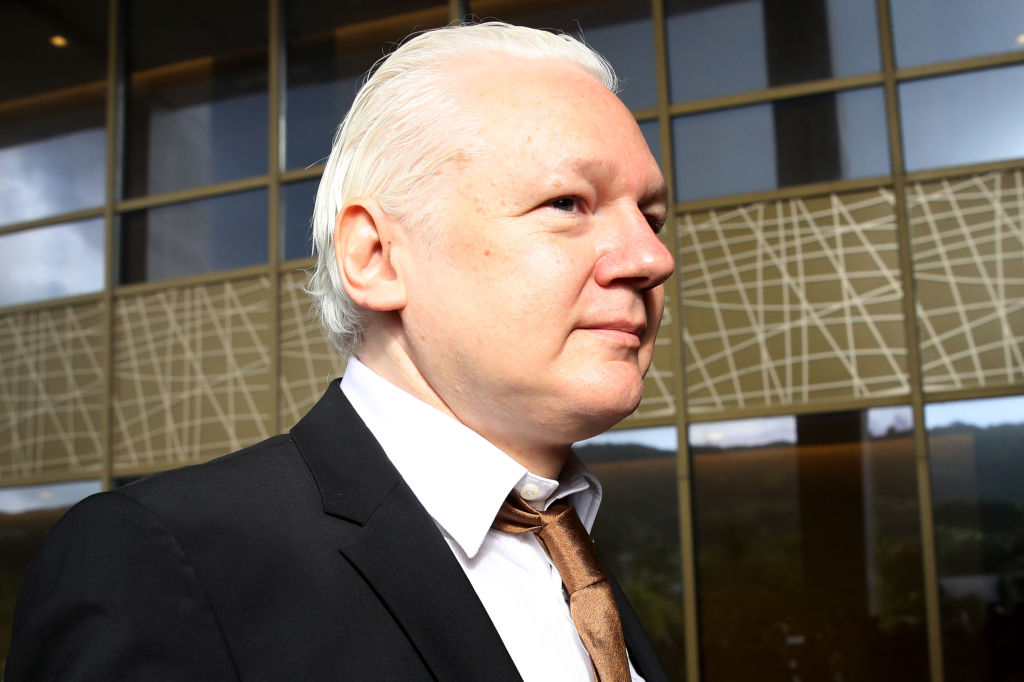
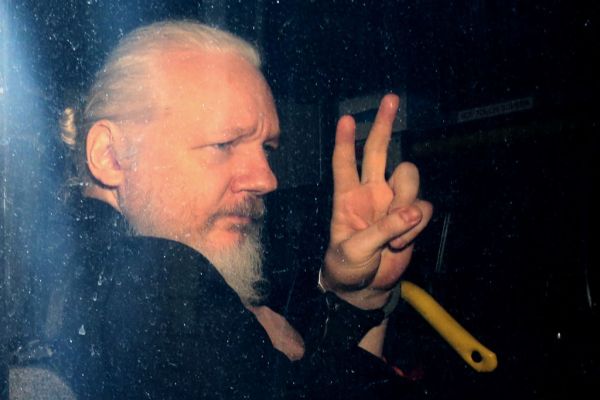
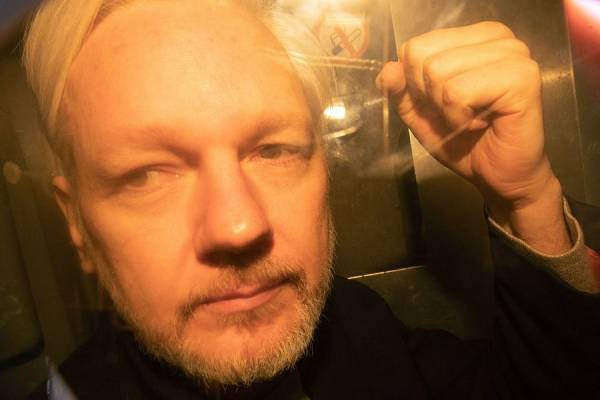
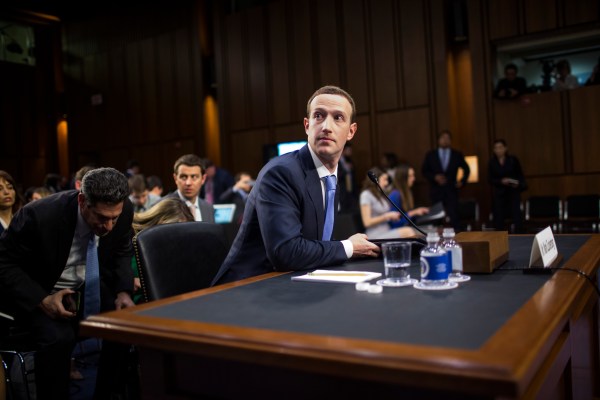
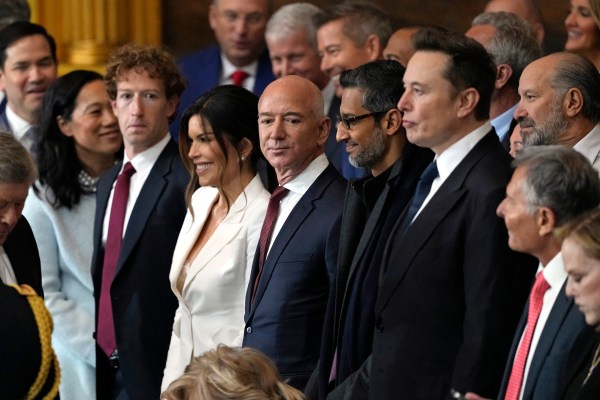




Please note that we at The Dispatch hold ourselves, our work, and our commenters to a higher standard than other places on the internet. We welcome comments that foster genuine debate or discussion—including comments critical of us or our work—but responses that include ad hominem attacks on fellow Dispatch members or are intended to stoke fear and anger may be moderated.
With your membership, you only have the ability to comment on The Morning Dispatch articles. Consider upgrading to join the conversation everywhere.